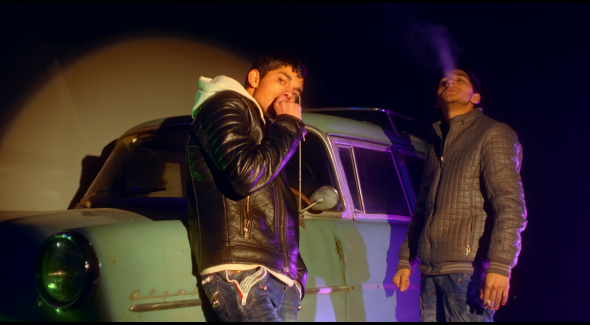Patric Chiha
Patric Chiha (b. Vienna, 1975) is an Austrian film-maker of Hungarian and Lebanese origin. After studying fashion design at ESAA Duperré (Paris) and editing at INSAS (Brussels), he directed several short and medium-length films and documentaries (including Les Messieurs, Home and Où se trouve le chef de la prison?), which were shown at numerous festivals. His first feature film, Domaine (2009), starring Béatrice Dalle, was selected for the Venice Film Festival. This was followed by Boys Like Us (2014) and the documentaries Brothers of the Night (2016) and Si c’était de l’amour (2019), both of which were selected at the Berlinale. He is currently finishing his new feature film, La bête dans la jungle, starring Anaïs Demoustier and Tom Mercier.
The nocturnal fraternity evoked by the film’s title is that of a group of Bulgarian Roma who have come to Vienna in search of a living. Most of them are barely eighteen years old, all as beautiful as gods and as proud as peacocks, and they have made money from trading their bodies with locals they met in the bar where the filmmaker discovered them. Brüder der Nacht is less concerned with their daily lives than with the way in which they narrate them. It sets aside the facts to approach life itself, looking for projections rather than proofs – hence the light sculptures that compose it and enchant its subject. If by nature his “genre” – documentary – oscillates between the judicial and the utopian, graft and prosthesis, he is resolutely on the experimental side: documentary here serves to germinate lives, voices that the world stifles. So his problem is not really prostitution, which is almost anecdotal here, stripped of all pathos and turned into the subject for tales. Rather, he wonders how such a virile and autarkic community is formed and survives, whose members live like night owls in a world apart where time no longer matters.
Hence its de-realising setup and its crazy, not always Euclidean spaces (the lights recompose the dimensions) that never really interlock (each one is cut off from everything outside it). This is also the reason why the film did not take its images from its initial locations, or only a few scenes were shot in the famous cabaret, and even then, its constantly evoked mythical place, the “Kabine” where people pay to press the flesh, remains out of the picture, perhaps because it is too real and raw, and therefore of only moderate interest. The filmmaker, as he explains below, preferred to rent places, “play spaces” (Spielraum) which are so many speculative bubbles for self-invention, and to make them available to these bodies, so that they can come and develop a desire for play in a theatre setting. Apart from the rare scenes shot in “real” (non-vivified) locations – a bedroom, a bar, a train station – most of them were shot in a space that is stage-like (flat, without much furniture) and fantastical (the space is misted up by people’s discourse). Documentary here is what allows us to escape from reality. It kneads the bodies, lubricates the image, inundates with words. It films fiction just when it is taking over and colouring life. If prostitution remains off-screen in Brüder der Nacht, this is not out of modesty, but out of indifference to the raw facts. Similarly, exile is never really transformed into a theme, but rather into an occasion, or a guarantee for freeing up a space for play – these young boys are also on holiday, or at least experience their migration as such.
The pleasure that governs their way of being ends up corrupting the film itself, which is affected by the contagion of pleasure and play. They mimic others in order to mock them, relate their experiences to falsify them, and Chiha follows the route they indicate. Everything in Brüder der Nacht is a copy of a copy or a simulacrum of a fantasy (cf. the leather jackets, a sign of the law of the Same). Prostitution is not seen as the supreme alienation that some are too quick to diagnose. Rather, it represents the height of simulation, of play. Constantly telling oneself stories, imitating clients, heroizing your dominant male posture even when in economic servitude, all this of course makes it possible to play down the financial nexus in these relations. It also reverses the relationship of possession inherent in all desire, which goes far beyond the old passive/active dichotomy: what these grandiose kids boast about, above all, is knowing how to play with the desire of the men who claim to make them their thing. To avoid being an object, you have to know how to make yourself an image – a fantasy.
What Brüder der Nacht is saying in its singular way is that prostitution – as a general model of serfdom and as the ultimate form of commodification – has lost its throne in the realm of scourges. The real issue is pollution – a word that originally, before referring to the ecological disaster forming our ecosystem, referred to masturbation guided by the images that the mind forms. Brüder der Nacht has all the makings of an economy of fantasy, but shies away from the drip-drip-drip with which we too often identify these desires – hence nothing spills over and everything is impeccable and well put together. Perhaps the secret of its beauty lies in this alliance of an overflowing imagination and an perfect and well-dressed image with a phobia of dirt. To depict prostitution through virginity is quite a challenge.

